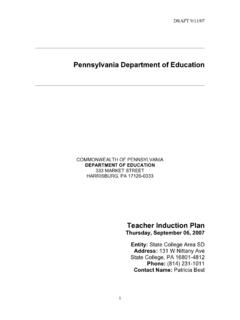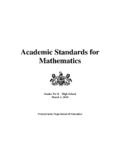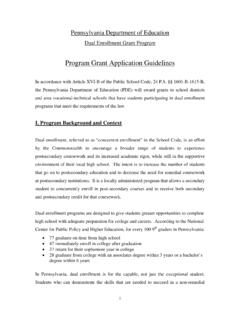Transcription of PENNSYLVANIA DEPARTMENT OF EDUCATION
1 PENNSYLVANIA DEPARTMENT OF EDUCATIONK eystone exams Program overviewGeneral informationThe Keystone Exams are end-of-course assessments designed to assess proficiency in the subject areas of Algebra I, Algebra II, Geometry, Literature, English Composition, Biology, Chemistry, History, World History, and Civics and Keystone Exams are one component of PENNSYLVANIA s new system of high school graduation requirements. Keystone Exams will help school districts guide students toward meeting state standards standards aligned with expectations for success in college and the workplace. In order to receive a diploma, students must also meet local district credit and attendance requirements and complete a culminating project, along with any additional district requirements.
2 For the graduating classes of 2015 and 2016, students must demonstrate successful completion of secondary-level course work in Algebra I, Biology, Literature, and English Composition, in which the Keystone Exam serves as the final course exam. Students Keystone Exam scores shall count for at least one-third of the final course grade. graDUation reQUirements PennsylvaniaGraduationRequirementsschool District graDUation Policies mUst at least inclUDe: State-developed Keystone Exam Counting as at Least 33% of Course Grade OR Independently-validated Local Assessment OR Keystone Exam as a Stand-alone Graduation Requirement OR Advanced Placement (AP) or International Baccalaureate (IB) Exam COMPLETION OF COURSES & GRADESGRADUATIONCOMPLETION OFCULMINATING PROJECTPROFICIENCY IN EACHSTATE STANDARDFINALPROJECTPROFICIENCY IN EACH MAIN SUBJECT AS DETERMINED BY: NOTEBOOK2 DemonStration of ProfiCienCY in main SUBJeCtS aS DetermineD BY.
3 State-developed Keystone Exam Counting as at Least 33% of Course GradeStudents in the classes of 2015 and 2016 will demonstrate proficiency in Algebra I, Biology, Literature, and English Composition with a final Keystone Exam. The Keystone Exam will count for one-third of the final course grade. For the classes of 2017 and beyond, requirements under this option will be expanded to include the following: Passing 2 English courses (Composition and Literature)*; Passing 2 Mathematics courses (Algebra I, Algebra II, or Geometry); Passing 1 Science course (Biology or Chemistry); and Passing 1 Social Studies course (Civics and Government, History, or World History).* The PENNSYLVANIA DEPARTMENT of EDUCATION (PDE) recommends administering the English Composition exam at the end of English 9 and Literature at the end of English 10.
4 Local AssessmentsLocal assessments need to be independently validated. This regulation preserves local control but sets consistent standards for locally-developed measures to ensure rigorous assessments, fair administration, and reliable results. The state will share validation costs with local September 16, 2010, the State Board of EDUCATION voted to allow districts to make the local policy decision to use a Keystone Exam as a stand-alone graduation requirement in a given content area; this local assessment option would be deemed approved for validation requirements in that content if students are required to score proficient or above. National AssessmentsNational assessments include Advanced Placement (AP) Exams and International Baccalaureate (IB) Exams.
5 PDE will issue policy guidance regarding the minimum score required on an AP or IB Exam to satisfy graduation stUDents with sPecial neeDs anD english langUage learnersAll students with special needs and English Language Learners are entitled to accommodations during instruction and testing. Accommodations are indicated in a student s Individualized EDUCATION Program (IEP) or Limited English Proficiency (LEP) plan. Contact your student s teacher or IEP team if you have questions about his or her program of study and participation on state tests. 3 Keystone exams scheDUleThe table below lists the dates when the different Keystone Exams will be available:Content areasfield testavailable for all SchoolsAlgebra I, Biology, LiteratureFall 2010S p r i n g 2 011 Algebra II, Geometry, English CompositionS p r i n g 2 011 Winter HistoryFall 2012 Spring 2013 Chemistry, Civics and Government, World HistorySpring 2015 TBDK eystone assessment anchors/eligiBle contentThe Keystone Exams are aligned to the PENNSYLVANIA Keystone Course Standards, Curriculum Frameworks and Assessment Anchors/ Eligible Content.
6 All were developed by PENNSYLVANIA educators. The PENNSYLVANIA Keystone Course Standards, Curriculum Frameworks, and Assessment Anchors/ Eligible Content are available on the Standards Aligned System (SAS) website at Design overviewThe first administrations of the Algebra I, Biology, and Literature Keystone Exams with operational questions are scheduled for May 2011. Each Keystone Exam operational form also will have embedded field test iThe Algebra I Keystone Exam will assess students mastery of the Algebra I Assessment Anchors as defined by the Eligible Content and will be aligned to the Concepts and Competencies. The table below shows how the standards will be separated between the two modules on the operational I KEYSTONE EXAM TEST DESIGN FOR STANDARDS module 1module 2 Assessment Anchors CoveredOperations and Linear Equations and InequalitiesLinear Functions and Data OrganizationNumber of Eligible Content Covered1815 The table below shows the types of questions and number of questions covered in the Algebra I Keystone Exam operational I KEYSTONE EXAM BREAKDOWN OF QUESTION TYPES module 1module 2totalMultiple- Choice Questions Constructed- Response QuestionsMultiple- Choice Questions Constructed- Response QuestionsMultiple- Choice Questions Constructed- Response QuestionsNumber ofOperational Questions 183183366 Number ofField Test Questions
7 5151102 Total234234468 The table below shows the types of questions and number of points covered in the Algebra I Keystone Exam operational I KEYSTONE EXAM B REAKDOWN OF POINTS module 1module 2 Number of Operational Multiple-Choice Questions 18 questions at 1 point each = 18 points18 questions at 1 point each = 18 pointsNumber of Operational Constructed-Response Questions 3 questions at 4 points each = 12 points3 questions at 4 points each = 12 pointsTotal Number of Points30 points30 pointsPercentage of Points for Entire Test50%50%There will be a total of 60 points (Module 1 and Module 2 combined), with approximately 60% multiple-choice points and 40% constructed-response table below shows the estimated time a typical student would need to complete Module 1 and Module 2 of the Algebra I Keystone Exam operational I KEYSTONE EXAM ESTIMATED TIME operational Questions field test Questions total Questions Number of Minutes11435149 The Algebra I Keystone Exam will have two different types of constructed-response questions.
8 Both types of constructed-response questions will be scored on a scale ranging from 0 4 Completion Questions are constructed-response questions that elicit two-to-four distinct responses from a student. When administered online, the responses are electronically entered by the student and are objective and concise. Some examples of student responses may be 5 gallons, vertex at (5, 11), or y = 3x + 9. A designated answer space/box will be provided for each part of the question. No extraneous work or explanation will be scored. To the greatest extent possible, automated scoring will be used to determine the point value of the responses. When applicable, Inferred Partial Credit Rubrics and Scoring Guides will be used to award partial credit to qualifying responses.
9 Extended Scaffolding Completion Questions are constructed-response questions that require students to respond with extraneous work or explanation for at least part of the question. For example, the student may be asked to Show all of your work, Explain why the curve is not a parabola, or What is the error in Jill s reasoning? When administered online, responses can be typed by the student, but scoring will not be automated. Question-specific scoring guides will be used by scorers to award credit, including partial credit, for responses. BioloGYThe Biology Keystone Exam will assess students mastery of the Biology Assessment Anchors as defined by the Eligible Content and will be aligned to the Concepts and Competencies. The table below shows how the standards will be separated between the two modules on the operational form.
10 BIOLOGY KEYSTONE EXAM TEST DESIGN FOR STANDARDS module 1module 2 Assessment Anchors CoveredCells and Cell ProcessesContinuity and Unity of LifeNumber of Eligible Content Covered16226 The table below shows the types of questions and number of questions covered in the Biology Keystone Exam operational KEYSTONE EXAM BREAKDOWN OF QUESTION TYPES module 1module 2totalMultiple- Choice Questions Constructed- Response QuestionsMultiple- Choice Questions Constructed- Response QuestionsMultiple- Choice Questions Constructed- Response QuestionsNumber ofOperational Questions 24324348 6 Number ofField Test Questions 8 18 116 2 Total32432464 8 The table below shows the types of questions and number of points covered in the Biology Keystone Exam operational KEYSTONE EXAM BREAKDOWN OF POINTS module 1module 2 Number of Operational Multiple-Choice Questions 24 questions at 1 point each = 24 points24 questions at 1 point each = 24 pointsNumber of Operational Constructed-Response Questions 3 questions at 3 points each = 9 points3 questions at 3 points each = 9 pointsTotal Number of Points33 points33 pointsPercentage of Points for Entire Test50%50%There will be a total of 66 points (Module 1 and Module 2 combined)



















